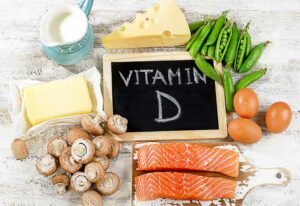With summer here, it’s time to take our health into our own hands and get informed about one of the most important vitamins – Vitamin D. Since most of us are now spending much more time indoors due to the pandemic, there is a growing concern over how little sun exposure we’re getting. Not only does this impact your mental well-being but can also have physical repercussions if your body isn’t receiving enough vitamin D from sunlight. In this blog, we’ll explore what role Vitamin D plays in overall human health as well as tips and tricks you can use to get appropriate levels naturally.
What is Vitamin D and why it’s important for your health
Vitamin D is a crucial nutrient that plays an important role in maintaining your overall health. It is essential for strong and healthy bones, as it helps your body absorb calcium from food. In addition, vitamin D also helps regulate your immune system and can contribute to reducing your risk of certain diseases such as diabetes, cancer, and multiple sclerosis. While fortified foods such as milk and cereals may contain vitamin D, the most efficient way to get the nutrient is through exposure to sunlight. It’s important to ensure you’re getting enough vitamin D, as deficiency can lead to a range of health issues such as rickets, osteoporosis, and depression. If you’re concerned about your vitamin D levels, it’s always best to consult with your healthcare provider.
How to get the recommended daily amount of Vitamin D
Vitamin D is essential for maintaining healthy bones and overall health. Unfortunately, many people do not get enough of this vital nutrient. The recommended daily amount of vitamin D varies depending on age and other factors, but in general, adults should aim for at least 600-800 IU per day. One of the best ways to get vitamin D is through exposure to sunlight. Spending a few minutes outdoors each day can help your body produce the vitamin D it needs. However, if you live in an area with limited sunlight or cannot spend time outside, you can also get vitamin D from foods like fatty fish, fortified dairy products, and egg yolks. If you’re still having trouble getting enough vitamin D, consider taking a supplement after consulting with your healthcare provider. By prioritizing vitamin D intake, you can help ensure that you maintain a healthy body and mind.
The benefits of spending time in the sun
The warmth of the sun on our skin can be invigorating, but did you know there are numerous benefits to spending time outside in the sun? Exposure to the sun is essential for our bodies to produce vitamin D, which is crucial for healthy bones and warding off a myriad of diseases. Additionally, research suggests that spending time in the sun can boost our mood by increasing serotonin levels in our brain. Moreover, sunlight can help regulate our circadian rhythms, which can improve sleep patterns and overall health. Of course, it’s important to protect ourselves from the harmful effects of the sun, such as sunburn and skin cancer, by wearing appropriate clothing and sunscreen. So, next time you’re feeling down, remember that a little bit of sunshine can go a long way for our physical and mental well-being.
How to safely protect yourself from harmful UV rays while enjoying the sun’s benefits
The sun is a wonderful source of vitamin D, but its rays can also be harmful to your health if you’re not careful. Fortunately, there are several ways to protect yourself from harmful UV rays while still enjoying the benefits of being outside. One key step is to wear protective clothing, such as hats and long-sleeved shirts. Another essential component is the use of sunscreen. When selecting sunscreen, look for one with an SPF of 30 or higher, and be sure to reapply every two hours or after swimming or sweating. Additionally, try to avoid being outside during peak sun hours, which are typically between 10 a.m. and 4 p.m. By following these simple steps, you can safely enjoy all the benefits the sun has to offer while minimizing your risk of sun damage.
Foods that are high in Vitamin D and how to incorporate them into your diet
 Vitamin D is an essential nutrient that helps build strong bones, improve immune function, and reduce the risk of chronic diseases. Although sunlight is the primary source of vitamin D, certain foods can also provide a significant amount of this nutrient. Some of the best dietary sources of vitamin D include fatty fish like salmon, tuna, and mackerel, egg yolks, and cheese. Incorporating these foods into your diet can be easy and delicious – try adding canned salmon to your salad or omelet, snacking on hard-boiled eggs, or enjoying a cheesy baked potato. Additionally, fortified foods such as milk, orange juice, and cereal can also help boost your daily vitamin D intake. Remember to check with your healthcare provider before making any significant changes to your diet.
Vitamin D is an essential nutrient that helps build strong bones, improve immune function, and reduce the risk of chronic diseases. Although sunlight is the primary source of vitamin D, certain foods can also provide a significant amount of this nutrient. Some of the best dietary sources of vitamin D include fatty fish like salmon, tuna, and mackerel, egg yolks, and cheese. Incorporating these foods into your diet can be easy and delicious – try adding canned salmon to your salad or omelet, snacking on hard-boiled eggs, or enjoying a cheesy baked potato. Additionally, fortified foods such as milk, orange juice, and cereal can also help boost your daily vitamin D intake. Remember to check with your healthcare provider before making any significant changes to your diet.
When to check with a doctor about getting a Vitamin D supplement
Vitamin D is essential for maintaining strong bones, a healthy immune system, and overall well-being. While our bodies can naturally produce Vitamin D when exposed to sunlight, many people may not have enough of this vital nutrient due to limited sun exposure or dietary restrictions. If you are experiencing symptoms such as fatigue, muscle weakness, or frequent illnesses, it may be time to check with your doctor about getting a Vitamin D supplement. Additionally, individuals who are over 50, have darker skin, or live in areas with limited sunlight may be at a higher risk for deficiency. Your doctor can evaluate your current Vitamin D levels and recommend a supplement plan to help you maintain optimal health.
In conclusion, Vitamin D is important for maintaining good health and having proper immune system function. During the summer months, sun exposure is a great way to get your daily recommended amount of Vitamin D but it’s important to use a sunscreen that suits your skin type and protects against UVA and UVB rays. There are several sources of Vitamin D available through food like fatty fish, dairy products, egg yolks, orange juice, protein powder, and some mushrooms. If you don’t feel like you’re getting enough easily through dietary means or through the sun it may be beneficial to speak with your doctor about taking a supplement. Taking time to ensure you get the right balance of Vitamin D on a daily basis will help keep your body healthy in the long run!
Getting enough Vitamin D at Buckley
At Buckley, we encourage our campers to spend as much time outside while partaking in a number of our fun outdoor activities. From basketball to ziplining, Buckley has a diverse set of activities that will keep your child active under the sun. To learn more, check out our activities and contact us today!

